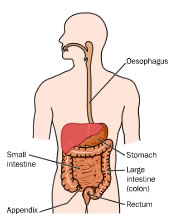For Parents of Children with Pedi IBD
What is Pediatric IBD?
About Pediatric IBD
Pediatric Inflammatory Bowel Disease, or Pedi IBD, is a group of chronic disorders that cause pain, swelling and inflammation of the small and large intestine. The two most common of these disorders are Crohn’s Disease and Ulcerative Colitis. In some instances, it can be difficult to know if your child has Crohn’s or Ulcerative Colitis, especially if your child is less than 5 years old. In this case your child’s doctor may label the Pedi IBD Indeterminate Colitis.
Frequently Asked Questions
Is Pedi IBD the same as adult IDB?
 No. Children with Pedi IBD are not small adults with IBD. Children with Pedi IBD often come to their doctors with different symptoms than adults with IBD. One of the most important issues that need to be addressed specifically in children with IBD is a lack of growth.
No. Children with Pedi IBD are not small adults with IBD. Children with Pedi IBD often come to their doctors with different symptoms than adults with IBD. One of the most important issues that need to be addressed specifically in children with IBD is a lack of growth.
Because childhood is a time when nutrition has the most significant impact on growth, if a child is not getting enough calories and nutrients, they will not grow and develop at a normal and healthy rate. It is very important that a lack of or delay in growth be recognized early and treated properly so that the child’s growth returns to normal.
What causes Pediatric IBD?
Causes of pediatric Crohn’s disease
We don’t know what caused your child to have Pedi Crohn’s disease, but research suggests that the cause of IBD is a combination of 3 main factors:
- genetics
- immune system
- environment
Though it is not known yet exactly how these three factors work together.
What we do know is that approximately 1.4 million Americans suffer from IBD. We also know that almost 30% of people with IBD have a close family member who also has the disease.
More than 100,000 are children like yours.
How is Pediatric IBD diagnosed?
After taking your child’s medical history and performing a physical exam, your child’s doctor has several tests that can be used to diagnose Pediatric IBD.
- Lab tests
- Endoscopic procedure
- X-rays
What are common symptoms of Pediatric IBD?
Symptoms can begin slowly or come on suddenly and progress quickly. Symptoms can also range widely from very mild to sometimes severe. Though there is no cure yet for Pedi IBD, symptoms can be well-controlled with proper treatment.
Common symptoms can include:
- Frequent diarrhea
- Stomach pain or cramping
- Blood in your child’s stool
- Fevers
- Weight loss
- Joint, skin or eye irritations
When should I call the doctor?
The following are a list of symptoms that can occur in children with Pedi IBD that your healthcare provider needs to know about:
- temperature above 101 degrees F
- abdominal pain or cramps that are out of the ordinary and do not go away
- an increase in the number of your child’s bowel movements
- a change in the consistency of your child’s bowel movements
- blood in the bowel movement or a change in the amount
- new rectal pain
- throwing up for more than 3-4 hours
- vomit that has bile in it (yellow/green color)
- Pediatric IBD: When to call your health care providerbloated stomach
- tiredness that doesn’t go away
- rashes, especially on the lower legs
- swelling or pain in the joints
- swollen or red eyes
Remember, you know your child best. Trust your judgment. If your child is experiencing something that you are not sure about or that makes you feel uncomfortable, let your healthcare provider know right away.
